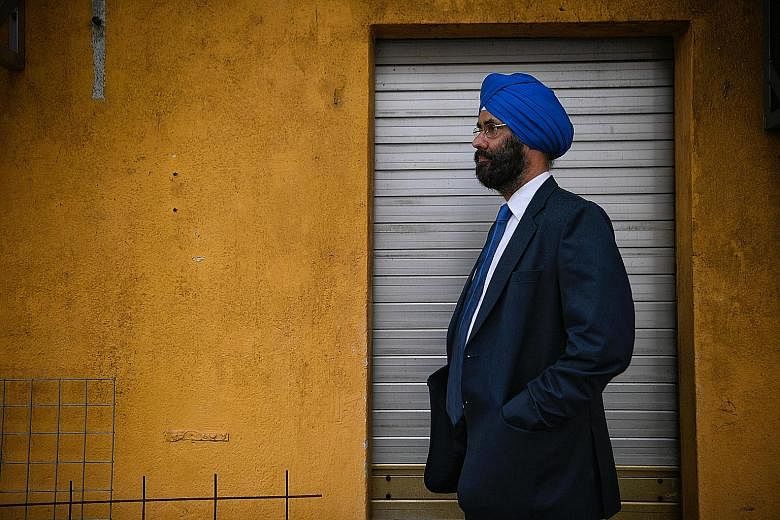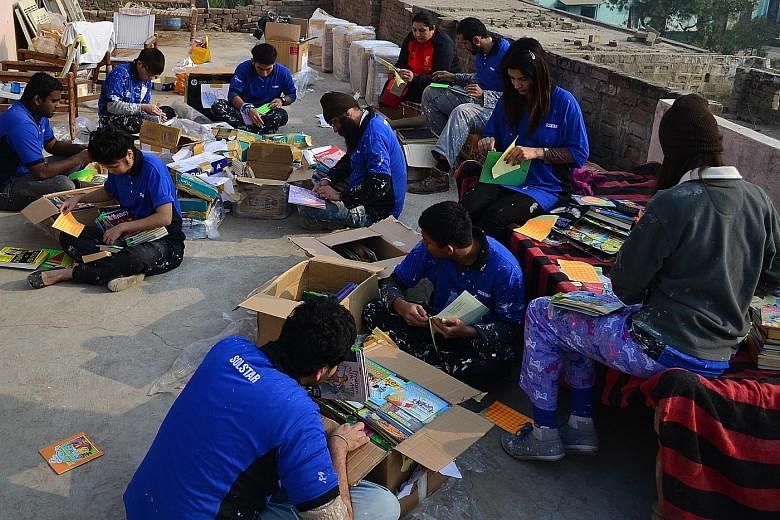On Saturday, Satwant Singh will be setting off for a poor village called Ratokke in the Sangrur district of Punjab, India.
Going with him are about 20 young Singaporeans, aged between 18 and 21, from different ethnic and socio-economic backgrounds.
For three weeks, they will live among the villagers as they paint and renovate their run-down school. Among other things, they will be building a library and stocking it with 3,000 books, installing a water filtration system so that students can have clean water, and reconstructing the school's mouldy and dilapidated toilets.
They will also distribute stationery to students, and clothes and other necessities to poor villagers.
It's not Mr Singh's first such trip. The lawyer has been doing this every December for the past 14 years. The Ratokke village school will be the 17th school he has rebuilt and repaired with different teams of young volunteers.
Called Project Khwaish, it is an initiative he started and organised with the Young Sikh Association (YSA). Part of the funds come from the National Youth Council, with Mr Singh and his volunteers raising the rest.
"The volunteers are Chinese, Malays, Indians, Sikhs and Eurasians, Singaporeans. They live together, eat together, sleep on the floor together, learn to live as one entity. The common interest and goal is to do good," says Mr Singh, who is in his early 50s, adding that the focus is on schools because of his belief that education will give the poor a better shot at life.
He should know, because it was what forklifted him from his beginnings as a peon to a lawyer with his own firm.
The bearded Mr Singh is sitting in his shophouse office in Rifle Range Road. Blue is obviously a favourite colour since he's wearing a blue suit, blue tie, blue turban and an IWC Portuguese watch with a blue strap.
He was born in Johor, the fourth of eight children of a policeman-turned-driver and a housewife. When he was five, the family moved to Singapore where they lived for the next decade in a one-room flat in Whampoa.
Life was hard but he and his siblings, who had to sleep on the floor and share one toilet, were happy.
"There were eight of us so chicken was a luxury which we had once every two or three months. But on Sundays, my father would cook chapati, put sugar, make them into balls and feed them to us with Milo and that was joy, you know," he says, adding that the family could only afford to buy a TV when he was 15.
Although he did well at Griffiths Primary and Woodsville Secondary, he had to leave school after completing his O levels because his father couldn't afford to let him continue his studies.
"I was heartbroken. I remember I cried and cried and cried, I was so, so angry," he recalls.
His first job was as a peon for a textile company. After a month, his boss had him liaise with customers from Pakistan and India because he was streetsmart and conversant in Hindi and Punjabi.
"One year later, my boss opened a new shop in High Street Centre and asked me: 'Do you want to manage?' I said: 'No... I'm 17 years old, too young.' So he put a manager there but I ran the show, looked after the customers, did everything," he recalls.
That included stuffing tens of thousands of dollars in his pockets and depositing the cash at the bank.
"I'd walk all the way from High Street to the Indian Bank in Shenton Way, look around to make sure I wasn't being followed," says Mr Singh, who completed his A levels by attending night classes.
Financial problems at home prompted him to sign on with the Singapore Armed Forces after he completed his national service.
For nearly a decade, he was a physical training instructor (PTI) at the School of Basic Military Training. "A lot of men in Singapore were my recruits. They called me PTI Singh. I was a terror," he says with a grin.
He found the stint enjoyable but decided to call it a day in 1992 because of a back problem.
Life moved at a cyclonic pace over the next few years.
Professionally, he hit his stride, managing a clothing company.
"We were wholesalers. I managed to get into big department stores including Mustafa for my boss, selling by the container load. The salesmen all loved me, one of them was my former recruit," he says.
In the evenings, he attended classes for an external law degree from the University of London.
"It was jialat," he says, using the Hokkien phrase for hard or tiring.
To top it all, he got married during this period. His father had been bugging him as the eldest son to get married once he left the army.
Attempts to ward off his old man, who had picked him a bride from Punjab, came to nought. Things came to a head when his father was knocked down by a bus while riding his bicycle one day.
"My mother came to me crying, said it was critical, and asked me to fulfil his dying wish."
And so at 26, he found himself a married man.
"The minute I said yes, my father miraculously recovered. So all my friends said it was a hoax between the doctor, my father and my mother," he says with a guffaw.
Three months later, his wife became pregnant with their son Kevinjit, named after English footballer Kevin Keegan. Daughter Steffijit - named after German tennis player Steffi Graf - arrived two years later. Kevinjit, 24, is now a deejay, and Steffi, 22, is doing a degree in business management.
"Those were very difficult years. I went to work, went to school, came home, put my kids to sleep and studied until 3 or 4am before waking up at 7am," he says, adding that money was tight because he was still supporting his parents.
His life took a new turn after he was called to the Singapore bar and became a lawyer in March 1997.
He cut his legal teeth with Yeo Perumal Mohideen as a litigation lawyer; his clients were mainly foreign workers suing employers over wages and personal injury claims.
He tells stories of unscrupulous contractors forcibly packing off workers, sometimes with the help of security guards, back to India before they could seek legal recourse for their woes.
After nine months, Mr Singh joined another firm where he took on general litigation work for more than 10 years.
He struck out on his own and set up Satwant & Associates in 2010. He now has two offices, with about 15 staff including five lawyers.
Mr Singh's foray into community service started nearly 20 years ago when he became a volunteer at Meet The People sessions in Kolam Ayer.
It was a way of giving back.
"I came up through the very hard way, where nobody helped me. I was on my own and if I didn't survive, then just too bad.
"But I felt that if I could lend a helping hand, why not? We don't lose anything. If you can take the first step, you may make a big difference. Many of us want to help but don't know how or are shy."
The sessions, at which he would help handle requests from constituents, proved to be eye-opening in more ways than one.
He remembers a man, with five children, who owed the Housing Board $74,000 but refused to heed Mr Singh's advice to sell it and get a rental flat for a few years to rebuild his finances.
"I told him he shouldn't let HDB repossess the flat because he would lose money. He turned to me and said: 'How can you live in a one-room flat, Mr Singh? You know how difficult it is?'
"So I told him: 'Ten of us lived in a one-room flat with one toilet and survived for 10 years. So what is it that you want to tell me?' "
The man eventually did as Mr Singh advised.
Joining humanitarian charity Mercy Relief in 2003, he says, was also revealing and life changing.
Now the charity's vice-chairman, he has gone on many trips - Banda Aceh after the 2004 tsunami, Nepal after the 2015 earthquake - in which he witnessed carnage, destruction and human misery at close range. It reinforced in him the need "to do what we need to do to help our fellow humans".
"We need to go and help, we cannot just stand by the side," he says.
In 2003, Mr Sikh started the YSA with a few friends because they felt there was a lacuna in service organisations for Sikh youth.
Project Khwaish became their flagship programme; it takes its cue from Youth Expedition Project, a service-learning programme which sets out to nurture confident and socially-conscious young people.
It decided to do its community service projects in Punjab, because of its natural ties to the YSA as an organisation for Sikh youth.
Before each annual expedition, Mr Singh goes on reconnaissance trips, which he pays for out of his own pocket, to look for suitable schools in need of an upgrade. He then meets the teachers and village elders to firm up the project.
The volunteers come from different tertiary institutions and schools. Over three weeks, they do everything from building science labs and holding training sessions for teachers to setting up computer centres. They also hire local labourers to build walls and more complicated structures.
"By the time we leave, we give them a brand new school," says Mr Singh.
Volunteers are not allowed to stay in hotels and have to live, and eat, as the locals do.
"Only then will they appreciate life and what they have. They can't think: 'I go to the school, do a bit of work and save the world. That is never true... I always tell them just make a difference to one person. If you do, I say you've done your job, because that person will grow up and hopefully, he pays it forward."
Looking pleased, he says the volunteers benefit from the experience. "I've seen the impact. When the volunteers come back, they are better and they get involved in other community service work."
Asked how his life has changed because of what he does, Mr Singh says: "I appreciate life. I see people as people. And if they need help, I will give it if I can."



